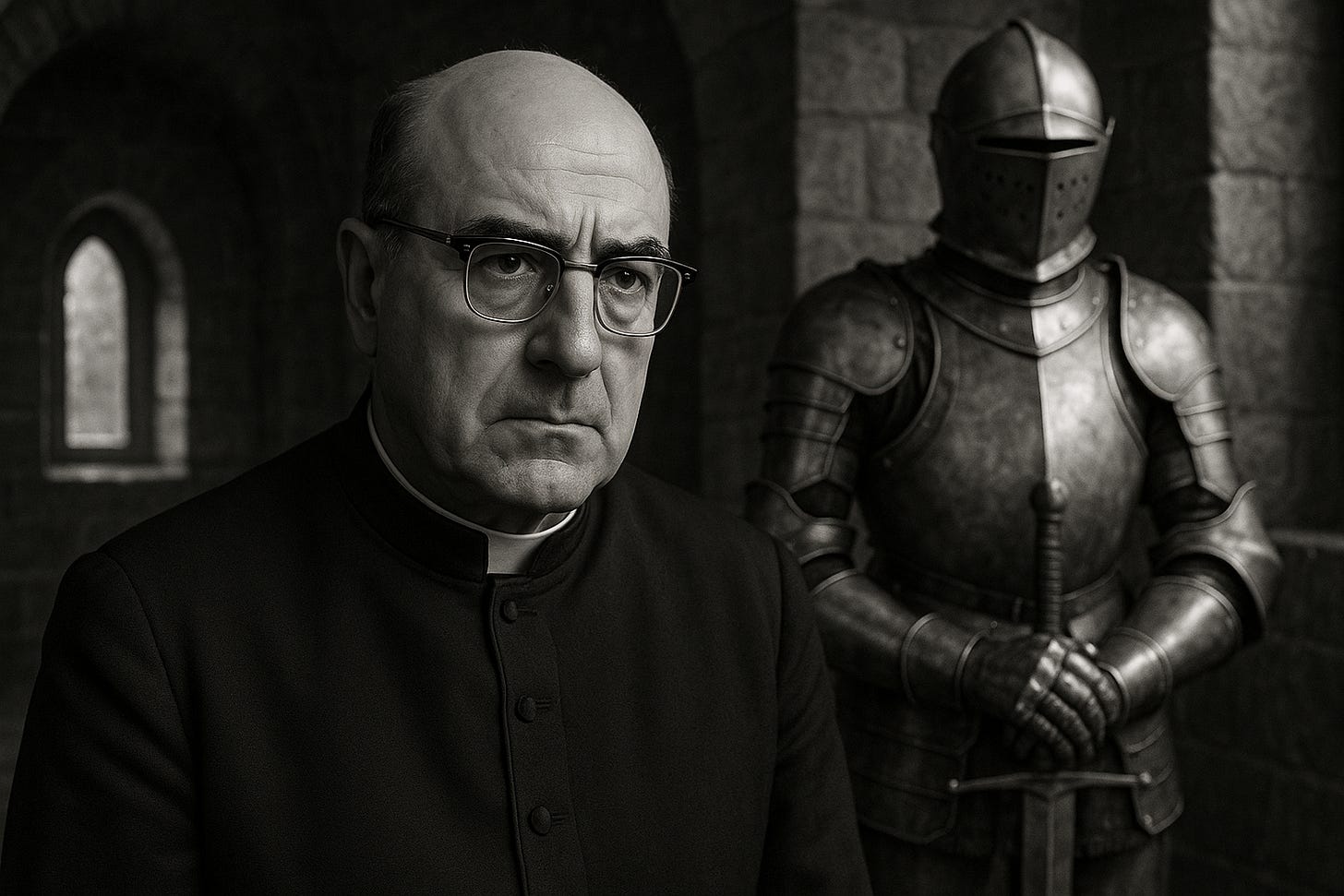'Gone is the time for a peaceful life for easy-going Christians' (Fortes in Fide)
'The armour of God' explained: Fr Noël Barbara's Editorial to the first English edition of 'Fortes in Fide.'

'The armour of God' explained: Fr Noël Barbara's Editorial to the first English edition of 'Fortes in Fide.'
Editor’s Notes
What follows is the Editorial of the first English edition Fr Noël Barbara’s Fortes in Fide (N. I Vol. I.) It is based on the typeset version of the late James McNally. Unfortunately, at this time of republication, it has not been possible to ascertain the date of the original text.
We have already published the foreword, by Fr Peter Morgan – the first English priest ordained by Archbishop Marcel Lefebvre for the SSPX – and the open letter from Barbara and Morgan, also signed by Fr Louis Coache and Mgr. François Ducaud-Bourget. This letter stated that “a new religion has been established,” and reaffirmed a long list of truths which were being questioned or denied at the time.
In the Editorial, Barbara sets out his agenda for Fortes in Fide, and explains the passage from St Paul’s Epistle to the Ephesians about putting on the armour of God.
The next parts of this series will consist of Barbara’s expositions of Faith and Revelation.
Fortes in Fide
N. I, Vol. I.
Part II: Editorial
Some headings and line breaks added. Asterisks replaced with dividing lines.
On the 23 March 1949, when receiving in audience the Parish Priests and Preachers of Rome, the great Pope Pius XII, said to them, amongst other things:
“Meditate, dear sons, on the words of Our Lord on the eve of His Passion, which He addressed to the Apostle Peter: ‘Satan hath desired to have you that he may sift you as wheat’, words of great significance at this moment in which we are living. They apply not only to the shepherds but also to all the flock.
“In the formidable religious controversies which we are witnessing, we can only truly count on the faithful who pray and who strive, even at the cost of great sacrifices, to conform their lives to the divine law. All the others in the spiritual order, and it concerns this order, offer themselves uncovered to the attacks of the enemy.”
In this declaration of the Pope we would like to emphasize two points:
the tremendous religious controversies which Pius XII witnessed;
the fact that the words of Our Lord to Peter had a tremendous importance for Pius XII.
What were the religious controversies during the reign of Pius XII?
This great Pope spoke of them especially in his Encyclical Humani Generis of 12 August 1950, in which he dealt with “some false views which threaten (that is in 1950) to undermine the foundation of the Catholic Church.”
“And these views”, the Pope specified “are not only to be found among the clergy, secular and regular, in the seminaries and religious institutions, but also among the laity, among those especially who are engaged in teaching.”
Twelve years later, on the occasion of the Second Vatican Council, the evil wrought by “these false opinions” could be clearly seen among the ranks of the secular and regular clergy, and among the laity engaged in the teaching profession as well. From then on we can no longer speak of “risk” but of “disaster”, because the foundations of the Catholic Church are shaken and many of her institutions have fallen to the ground.
Satan’s action sifting the Church militant
Whatever may be the perversity of men in face of the enormous evils which are shaking the foundations of the Church militant, in the suddenness of their appearance in the full light of day, the rapidity of their growth and the cohesion of their attacks, we are forced to recognize the hand of the devil, “the smoke of Satan”, who helps, directs and co-ordinates all of this subversion installed in the holy place.
A warning, however. “To see the devil everywhere is an error”, Mgr. A. de Boismenu wrote to his missionaries, “but not to see him anywhere is worse, all very well for the carnal man, but bad for the spiritual man.” The Bishop of Papua, New Guinea, added this:
“A Priest above all must know that, from the most cruel and terrifying persecutions, to favours or the most playful mischief, are all used by the devil to seduce and ruin souls; and, for my part, I see very clearly that the infinite Goodness of God allows, or even orders these manifestations, so as to expose the enemy and to impel souls towards their only refuge.” (Fr. Barbara, Catechism of Marriage, p. 544)
Here, then is one of the reasons why God allows the enemy to act in order to impel souls towards their only refuge, the Church.1
* * *
Satan has thus claimed, and Jesus has given us to understand, that God has allowed him to sift His Church militant as wheat is sifted.
To sift, means to separate, to sort out by means of brusque shaking, repeated without truce or mercy, just as is done with wheat to preserve only the finest kind of grain.
And it is because Pope Pius XII realised that “the formidable religious controversies” which he witnessed, were the consequence of such a permission given by God to Satan to sift the Church, that these words of the Master appeared to him to have such moving meaning. How is it, then, that we are not moved, we who see no longer the sign but the reality of this ordeal, souls shaken, scandalized, and in great danger of being lost for all eternity?
In this terrible and fearful trial, as Pope Pius XII warned us in those words of his, “we can only truly count on the faithful who pray and who strive, even at the cost of great sacrifices, to conform their lives to the divine law.”
“The Kingdom of Heaven suffereth violence, and the violent bear it away.” (Matt. XI, 12)
The violent are those who strive, even at the price of great sacrifices, to conform their lives according to God’s law.
Gone is the time, if there ever was one, for a peaceful life for easy-going Christians; henceforth, the crisis from which we suffer compels us to take up the fight, to renounce ourselves and to make efforts, even violent efforts, to live according to the law of God.
The armour of God
“Man’s life on earth is a battle”, and that being so, as the Apostle said:
“Put you on the armour of God, that you may be able to stand against the deceits of the devil. For our wrestling is not against flesh and blood but against principalities and powers, against the rulers of the world of this darkness, against the spirits of wickedness in the high places.”
These are the fallen angels who inspire not only the fomenters of heresy and schism, but also those who persecute us and our brethren.
“Therefore take unto you the armour of God, that you may be able to resist in the evil day, and to stand in all things perfect.”
The trials, temptations, vexations and even persecutions matter little; the essential thing is to stand firm, not to be discouraged, and to resist until the end.
“Stand therefore, having your loins girt about with truth, and having on the breastplate of justice.”
The loins were considered to be the seat of an athlete’s strength; the strength of the soldier of Christ lies in the truth, which is the word of God, authentically taught by the infallible Church, that is to say, in Catholic doctrine and the traditional catechism. As for the “breastplate of justice”, it is none other than “the wedding garment”, the state of grace, the friendship of God.
Having, in the words of the Apostle, “feet shod with the preparation of the Gospel of peace” means possessing a living fervour to serve the cause of God.
“In all things taking the shield of faith, whereby you may be able to extinguish all the fiery darts of the most wicked one.”
Above all, in the midst of the combat, the Christian, a soldier of God, lives by faith, that theological virtue which enables him to adhere to the words of God, Who despite all appearances to the contrary, will enable him to believe, as true and certain, the truths revealed by God and traditionally taught by the infallible Church. It is this theological virtue which will protect him and help him to overcome the attacks of the devil.
“And take unto you the helmet of salvation and the sword of the Spirit, which is the word of God. By all prayer and supplication, praying at all times in the Spirit and in the same watching with all instance and supplication for all the saints.”
The Apostle Paul insists on the absolute necessity of prayer, for without the help of God, we can do nothing and this help is obtained by persevering prayer.
“And for me, that speech may be given, that I may open my mouth with confidence, to make known the mystery of the Gospel.” (Eph. VI, 11-19)
These are the words which St. Paul used to recommend himself to the prayers of those to whom his letter was addressed. May I likewise do the same for myself, and ask my English readers not to forget me in their prayers and to ask God to give me the right words with which to announce the mystery of the Gospel with assurance and strength, having in mind only God’s Glory and the salvation of the souls.
In this time of affliction Christians must remember:
That in the Church militant they are faced with diabolical powers.
That it is, therefore, on the supernatural plane that the struggle must take place.
That the two great weapons at their disposal are prayer and faith.
It is certainly necessary for them to fight and to organize in order to stand firm, but they will make the most careful plans and establish the most promising organizations in vain, if they do not begin by being converted themselves and by leading a life of intense prayer. “We ought always to pray, and not to faint”, for we know only too well that “the spirit indeed is willing but the flesh weak”, and even more is this so when the days are evil.
First of all then, pray, and then live by faith, for we must not forget that it is with faith, on the supernatural level, that we must fight the Lord’s battles.
With the object of helping those who wish to read our publication, Forts dans la Foi, we are proposing to produce an English edition.
Fortes in Fide (the title of the English edition), is a Catechetical magazine and it was originally started to meet the urgent needs of the present time.
In the recent past, practising Catholics felt certain of their salvation in the Church. Each Sunday the priest’s sermon reminded them of and explained Catholic doctrine, that is truths to be believed and moral teachings to be practised, accompanied by such exhortations as his zeal suggested to him to stimulate the indifferent. At different times during the year, at Advent, or Lent, or for some great feast, a special preacher might come to give a parish retreat which stirred up the ardour of devotion and which was always, of course, truly orthodox. In addition, in case of need, for example to settle some doubt, the faithful could always go to their priests knowing that these would teach them nothing but the doctrine of their Mother, the Roman Catholic Church.
Now everything is different. The faithful have become “like a flock without a shepherd”; in the majority of their churches, even the most certain truths are questioned by the very ones who ought to be strengthening their faith, and it is no longer rare for the “new-style pastors” openly to teach heresy and immorality.
Not being able any more to trust their “reprogrammed priests, Catholics have an obligation to enlighten their faith by studying Catholic doctrine. It was in order to help them to do this that we started to produce our magazine Forts dans la Foi.
The subjects we propose to study in the first number of the English edition are Faith and Revelation, since it is faith in the revealed word of God which is the great means whereby we are able to “stand firm.”
In subsequent issues we will take up the study of the Church. It is an underlying fact of the present crisis that there are many Catholics who are no longer Catholics; since they no longer accept the Magisterium of the Church, they are like Protestants. We will therefore deal with the foundation by Jesus Christ of a visible, hierarchical and infallible Church which is charged with teaching us, in His name, the whole of the Revelation which He has given to mankind.
We will see afterwards what is the value of this teaching and, thus enlightened by the true Catholic doctrine about Christ’s Church, we will be able to tackle the study of the Subversion which has been introduced and is installed in the Church militant, and to indicate a line of practical conduct to help those who wish to follow it, to remain in the one Church of Christ, the Roman Catholic Church, “outside of which there is no salvation”; thus enabling them to protect themselves from “the ravening wolves” who have come into the Sheepfold “in the clothing of sheep.”
We hope to be able to produce six numbers of the review a year, on the terms set out in the accompanying leaflet.
FATHER NOËL BARBARA
HELP KEEP THE WM REVIEW ONLINE WITH WM+!
As we expand The WM Review we would like to keep providing free articles for everyone.
Our work takes a lot of time and effort to produce. If you have benefitted from it please do consider supporting us financially.
A subscription gets you access to our exclusive WM+ material, and helps ensure that we can keep writing and sharing free material for all.
(We make our WM+ material freely available to clergy, priests and seminarians upon request. Please subscribe and reply to the email if this applies to you.)
Subscribe to WM+ now to make sure you always receive our material. Thank you!
Read Next:
Follow on Twitter, YouTube and Telegram:
There was a stray closing speech mark here, which we have deleted.



The Time is now! Blessings!
But why did Pope Pius XII give recognition to the Opus Dei?